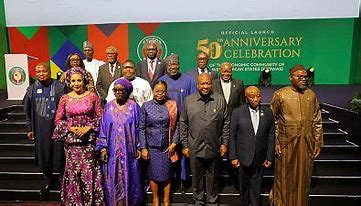Fifty years ago, on May 28, 1975, fifteen West African nations came together in Lagos to form the Economic Community of West African States (ECOWAS). The vision was to promote economic cooperation, unity, and freedom of movement across borders. The founding initiative was driven by leaders like Togolese President Gnassingbé Eyadéma and Nigeria’s then-head of state, General Yakubu Gowon. Liberia’s President William Tubman was chosen as the bloc’s first leader.
The Lagos Treaty, which marked the birth of ECOWAS, aimed to ease trade and strengthen ties among the member states. By 1990, the region had taken a further step by removing the requirement for identity cards when travelling between member countries.
Today, however, the bloc is facing one of the toughest periods in its history. Military-led governments in Mali, Burkina Faso, and Niger announced their withdrawal last year and have since formed the Alliance of Sahel States. They have also cut long-standing military ties with countries like the United States and France, and are now working more closely with Russia.
In response, ECOWAS introduced temporary measures to keep trade and movement going. But tensions rose further when the three countries imposed a 0.5% import duty on goods from ECOWAS states, directly affecting the region’s long-standing free trade principles.
As leaders meet in Accra to review the situation, the focus has shifted to how ECOWAS can maintain unity while responding to the shifting political landscape.
The timing of the 50th anniversary is especially sensitive. The region continues to struggle with insecurity. Armed groups have expanded their presence in parts of Nigeria, Benin, and the wider Sahel, taking advantage of weakened cooperation among member states.
Over the past decade, nearly half of ECOWAS countries have experienced coups or attempted takeovers. Many of these changes were driven by frustration over governance, inequality, and the perceived failure of political leaders to deliver basic services.
The exit of the three Sahelian countries is widely seen as a major setback. Dr. Kwesi Aning of the Kofi Annan International Peacekeeping Training Centre in Accra said the bloc is drifting away from the hopes and aspirations that guided its creation. “It points to serious challenges in leadership across the region,” he observed.
Nigeria, home to the largest economy and population in West Africa, is expected to lead efforts to steady the bloc. But a recent report from SBM Intelligence highlighted internal issues—economic pressures, political tensions, and insecurity—as factors limiting Nigeria’s ability to play that role effectively.
On the ground, the impact of these changes is already being felt. Before relations broke down, traders from northern Nigeria sent truckloads of grains daily to Niger through the Dawanau market in Kano. Although trade continues, costs have soared.
“We used to pay 100,000 naira per truck in duties,” said truck driver Aliyu Abubakar. “Now we pay five times that.” The steep increase has pushed some to find other means to move goods across borders.
“Smuggling has become more common,” said Mustapha Buhari, a resident of Mai-Adua, a border town in northern Nigeria.
As ECOWAS marks half a century of existence, the bloc finds itself at a crossroads. The path forward will depend on its ability to navigate internal tensions, strengthen cooperation, and renew the trust of its people across West Africa.



